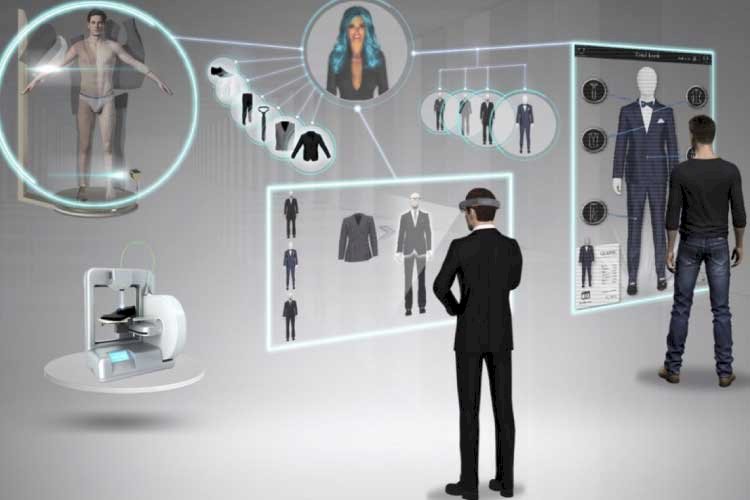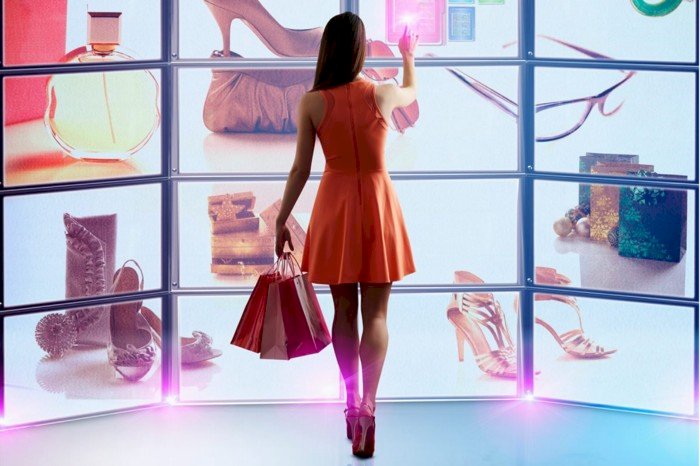How Machine Learning In Fashion Is Changing The Trends And Impacting The Industry?
The contribution of fashion industry is around 2% of GDP valuing around US$ 3 Trillion making this industry significant enough to attract the new investments in technology improvements.
The contribution of fashion industry is around 2% of GDP valuing around US$ 3 Trillion making this industry significant enough to attract the new investments in technology improvements. Artificial Intelligence (AI) and machine learning (ML) based technological investments in this industry is changing the trend and giving a new dimension to entire business.
AI has become necessary for the fashion industry in 2020 that 44% of the fashion retailers who have not adopted AI are at brink of bankruptcy. As a result of this, global spending on AI technologies by the fashion & retail industry is expected to touch $7.3 billion annually by the year 2022.
AI models not only for fashion industry but also almost other fields are developed through machine learning. Hence, machine learning in fashion industry is going to play a decisive role is changing the trend and shopping experience of the customers. Here, we will find out how AI and machine learning is going to impact the fashion industry and what are the various aspects you should know.
Impact of AI and Machine Learning in the Fashion Industry
Reinforced by the easy accessibility of big data, customer personalization, and other services in fashion companies are simply no longer feasible without the use of AI in fashion. As per the McKinsey report, the leading 20% of the global fashion brands are generating 144% of the industry profits.
This means that for any fashion brand, it needs to be in the top 20% to be a profitable business. Motivated by such needs, fashion brands are investing in AI and ML technologies to remain relevant in a highly competitive marketplace.
Not adopting the technological advancements with the time being, fashion industry will not survive. So, companies are not implementing the AI and ML into their business operations and marketing to gain the competitive edge among the rivals and escalate their market share. To understand better let’s find out how and where the AI and ML impacting the industry.
Designing the Apparels
Utilizing the power of bid data, fashion brands are using technology to understand customer needs and design better apparel. For example, a Germany-based fashion platform, Zalando (in partnership with Google) is using AI-powered fashion designing that is based on the customer’s preferred colors, textures, and other style preferences.
Improving the Manufacturing Process
Popular fashion brands using AI and ML tools to identify fast-changing fashion trends and supply the latest fashion accessories to retail shelves faster than the “traditional” fashion retailer. As a result, leading fashion brands like Zara, Top Shop, and H&M are quicker in providing instant gratification to retail customers by recognizing seasonal demands and manufacturing the right supply of the latest clothing.
Virtual Merchandising
AI-enabled technologies like virtual reality (VR) and augmented reality (AR) are now reducing the gap between online and in-store shopping experience. For example, in-store AR allows shoppers to access any merchandise through digital media. Using VR technology, fashion brand, Tommy Hilfiger was able to create a virtual image of its pop-up retail store.
But how are fashion brands successful in implementing these technology-based capabilities? Using a variety of AI and ML algorithms. Let’s evaluate some of the popular algorithms in the next section.
How AI and ML Works for Fashion Industry?
Interacting with the customers, especially with online consumers, Chatbots – an AI-enabled customer support application can gather information about customer desires and intended purchases helping the fashion industry understand their customer better.
For example, an online shopper looking for a new shoe or dress can simply interact with an intelligent agent through a website or mobile app. Some of the popular fashion retailers using chatbots include Burberry, Tommy Hilfiger, and Levi’s.
Artificial Intelligence is becoming an important asset in the E-commerce industry. Apart from large eCommerce retailers or brands like Amazon, even small-time fashion retailers are now using AI and machine learning algorithms to understand fast-changing customer needs and expectations. For example, an online personal styling company, Stitch Fix is using ML algorithms to improve customer experiences along with supply chain management.
Among other applications, machine learning algorithms can precisely predict inventory demand thus reducing wastage and unsold inventory costs.
Briefly, AI for fashion is transforming how fashion companies are designing and manufacturing their products as well as how they are marketed and shipped to the customer.
Next, we shall look at how some of the key fashion players are utilizing AI and ML technologies with some notable use cases and case studies.
AI & ML Used by Top Fashion Brands with Use Cases
Either AI or ML, the impact of these highly sophisticated technologies is affecting the style and branding in the fashion industry. So, right here we brought the examples of four leading fashion brands that have and are leveraging from these technologies:
Alibaba
The China-based fashion retail giant, Alibaba have since 2018, adopted technologies that have revolutionized their shopping experience. With the launch of their first FashionAI store, the company introduced in-store features including smart garment tags, intelligent mirrors, along with Bluetooth chips embedded within every product.
Thanks to AI and ML capabilities, customers benefited from AI-driven fashion recommendations catering to their style preferences. Additionally, omnichannel technology allows FashionAI data to be integrated with the company’s smartphone app, thus providing seamless and consistent user experience.
Tommy Hilfiger
In partnership with IBM, Tommy Hilfiger pioneered the “Reimagine Retail” project that equips fashion designers with AI skills for designing. As a result, fashion students could learn a plethora of technical skills like natural language processing (NLP) or computer vision to design personalized clothing.
With the use of AI, fashion students could learn from thousands of fashion-related images that enhanced their creativity and reduced lead times for the fashion brand.
Macy’s
Launched first in July 2016, Macy’s AI-powered shopping assistant was aimed at improving customer’s in-store shopping experience. Using NLP, Macy’s “On Call” tool is able to respond to common customer queries like “Where can I find women’s footwear” or navigate to the location of their retail stores in the U.S.
Enabled by these technologies, this U.S. retail company has planned over 100 store closures that could save the company over $550 million in cost savings.
Amazon
With its AI-powered product recommendation system, this eCommerce giant has definitely revolutionized the online shopping experience. With its foray into using AI for fashion, Amazon is deploying an AI-enabled fashion designer algorithm that can design apparel by copying the design styles of many in-vogue clothes and applying them to a new clothing item.
Amazon’s other use case is enabled by its Echo Look fashion assistant that can provide personalized recommendations driven by machine learning.
Advantages of Using AI and ML into the Fashion Industry
More Personalize Shopping Experience by Customers
Be it the video streaming or the fashion industry, personalization is key to business success. Thanks to big data innovation, there is plenty of customer data waiting to be tapped and analyzed. Deep learning technologies like AI and ML along with business analytics is enabling fashion businesses to keep track of fashion trends and the purchasing behavior of individual customers.
More Interactive Customer Service
The emergence of intelligent chatbots and other assistive technologies has transformed customer service and the way shoppers interact with fashion brands. From tracking sales leads to recommending products, chatbots have improved conversions and the overall brand experience.
Better Inventory and Supply Chain Management
AI-based predictive analytics enable fashion retailers to learn from prevailing customer behavior and plan their inventory stocks accordingly. AI-powered tools can help the fashion business identify their best- (& worst-) selling items and plan their inventories accurately.
Reducing the Reliability on Humans with Automation
Another key benefit of AI and ML technologies is that it enables fashion houses to automate repetitive or mundane tasks usually performed by human agents. Tasks like data entry and customer support can be handled now by AI, thus freeing human agents to focus on more strategic activities.
Low Return Rate of Products
Return of sold items is a major bane for the entire fashion industry and can increase operational costs. Thanks to AI-enabled personalization and product information, today’s retail customers are more informed and are less likely to buy the wrong clothing item. This, in turn, does reduce returned products and also improves customer satisfaction.
Summing-up
With advance product designing, promotion with better delivery and more personalize shopping experience, AI and ML is going to impact the entire fashion industry. Further, with more investment by leading fashion brands in such technologies other fashion business owners will be encouraged to introduce the AI and ML into their operations and products promotion system.
And to improve the AI performance the high-quality machine learning training data is required, so that more and more information can be fed into the model for more precise predictions in real-life scenarios. And creating the relevant training data is another challenge for the AI companies. But data labeling companies are aggressively working round-the-clock to meet the demand for such data and helping the AI companies develop the more advance system for fashion and retail industry.
Share
What's Your Reaction?
 Like
0
Like
0
 Dislike
0
Dislike
0
 Love
0
Love
0
 Funny
0
Funny
0
 Angry
0
Angry
0
 Sad
0
Sad
0
 Wow
0
Wow
0

















